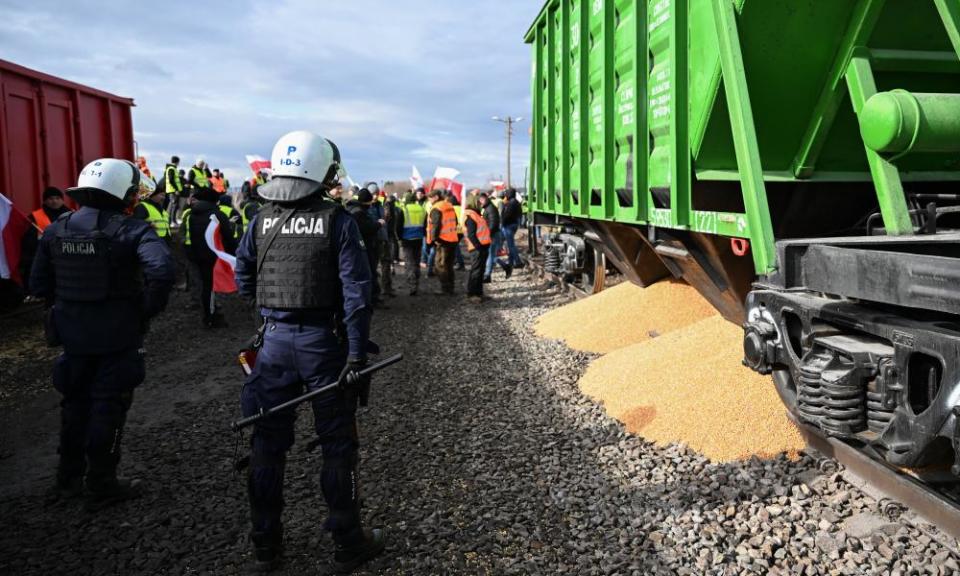Polish farmers dump grain in protest as Ukraine dispute deepens
Poland’s bitter dispute with Ukraine over farm imports has escalated as Polish farmers dumped grain from a freight train as part of nationwide protests and Volodymyr Zelenskiy accused Warsaw of “mockery”.
In a video address on Monday, Ukraine’s president described the blockade by Polish farmers as absurd at a time when Russia was bombing his country. “The situation is not about grain, but rather about politics,” he said, after a visit to the frontline town of Kupiansk.
He added: “Near Kupiansk, not far from the Russian border where enemy artillery is constantly active, the news from the Polish border looks like a mockery. We need joint decisions, rational decisions to get out of the situation.”
Zelenskiy said only 5% of Ukraine’s agricultural exports went through Poland and complained that the slowdown was undermining “solidarity” on a daily basis. The two countries, plus anyone who cared “about the fate of Europe”, needed to resolve the problem, he added.
Farmers in France, Belgium, Portugal, Greece, Spain and Germany have been protesting against constraints placed on them by EU measures to tackle the climate crisis, as well as rising costs and what they say is unfair competition from abroad.
In Poland, the protests have taken on an anti-Ukrainian character. The farmers allege that cheap agricultural goods have undermined their businesses. They want to stop the import of Ukrainian grain and to extend the ban to other goods including fruit, eggs and meat.
Protesting Polish farmers pour Ukrainian grain out of railroad cars pic.twitter.com/oir9jSszzu
— NEXTA (@nexta_tv) February 20, 2024
Last autumn, Polish lorry drivers blockaded border crossings with western Ukraine, claiming they faced unfair practices. Tractor-driving farmers joined in. The action ended in December, after a new Polish coalition government led by Donald Tusk took over.
Last week, the protests resumed. On Tuesday, Polish farmers dumped Ukrainian grain from freight cars parked at the Medyka-Shehyni border crossing. Protesters waved Polish flags and chanted: “This is Poland, not Brussels. We do not support Ukrainians.”
Ukrainian commentators said the farmers’ action brought back painful memories of the Holodomor, the Stalin-engineered famine of 1932-33 in which 4 million Ukrainians perished. Soviet crop collectors went from village to village, confiscating grain and agricultural tools, leaving peasants and their families to starve.
“Please make no mistake. These pictures are extremely disturbing for the Ukrainians,” Sergej Sumlenny, an expert on eastern Europe, posted on X. He said: “It triggers memories of the Holodomor, as Moscovy destroyed Ukrainian grain. I saw commentaries by usually very calm Ukrainians, who are shocked. This is an absolute no-go.”
The blockade has paralysed the movement of 2,900 cargo trucks waiting to cross from Poland back into Ukraine, officials in Kyiv indicated. Andrii Demchenko, a spokesperson for Ukraine’s state border guard service, said routes were almost completely blocked in six directions.
They included the Yahodyn, Ustyluh, Uhryniv, Rava-Ruska, Shehyni, and Krakivets checkpoints. Ukraine’s deputy infrastructure minister Serhiy Derkach said humanitarian aid and fuel were not getting through. “This has a direct effect on our defence capabilities,” he wrote on Facebook.
Over the weekend, Polish farmers intercepted three trucks at the Yahodyn crossing heading for Lithuania and spilled their cargo on to the road. Ukraine’s foreign minister, Dmytro Kuleba, called on the Polish authorities to take action against “provocateurs”.
“The spoiling of Ukrainian grain on the Polish border is unacceptable,” he said.
As well as military deliveries, passenger transport has also been affected, with reports that buses have been held up.
Talks with EU officials in Brussels and Poland have been continuing for a number of weeks, with spillages of cargo destined for Baltic countries also reported last week.
Olof Gill, a spokesperson for agriculture at the European Commission, described conversations as “rather positive and constructive” but said some of the issues were “longstanding and challenging”.
The commission wanted “to find solutions that will allow us to maintain maximum economic support for Ukraine”, he added.
The EU lifted tariffs two years ago on Ukrainian imports after Russia’s full-scale invasion of the country. Poland, Hungary and Slovakia subsequently imposed national bans on grain imports.
In Warsaw, Tusk convened an urgent meeting with his agriculture minister. The Polish prime minister has expressed sympathy with the protesters, describing their objections including over the EU’s green deal as “to a great extent justified”. The deal calls on farmers to reduce their carbon emissions and to do more to promote biodiversity.
He recently called for a balance between climate concerns and the “existential interests” of “social and professional groups”. Poland’s agriculture minister, Czesław Siekierski, says he wants to “regulate” trade with Ukraine and to “extend the scope” of existing bans on farm products.

 Yahoo News
Yahoo News 

